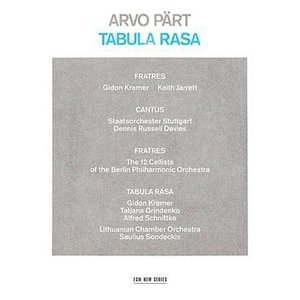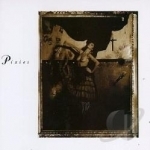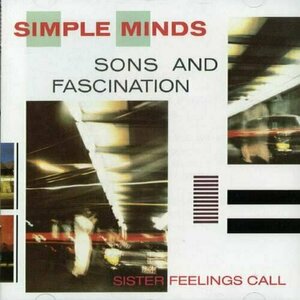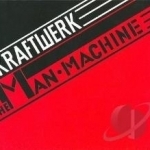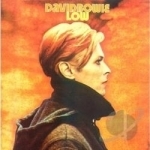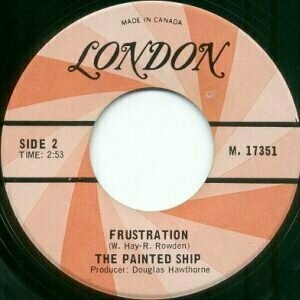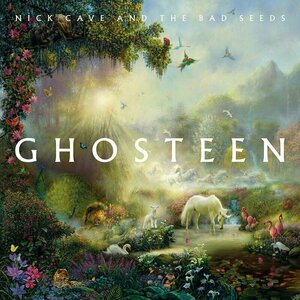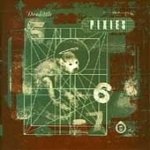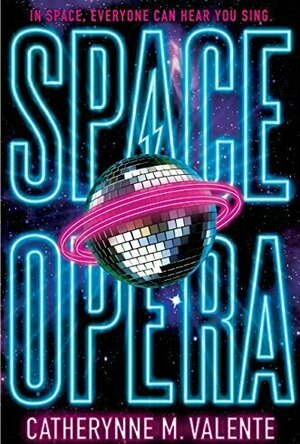Search
Search results
Colin Newman recommended Tabula Rasa by Arvo Part in Music (curated)
Yannis Philippakis recommended Surfer Rosa by Pixies in Music (curated)
James Dean Bradfield recommended Sons And Fascination by Simple Minds in Music (curated)
James Dean Bradfield recommended 154 by Wire in Music (curated)
Adam Ant recommended Man-Machine by Kraftwerk in Music (curated)
Graham Massey recommended Low by David Bowie in Music (curated)
Faris Badwan recommended track Frustration by The Painted Ship in Frustration by The Painted Ship in Music (curated)
Kirk Bage (1775 KP) rated Ghosteen by Nick Cave & The Bad Seeds in Music
Mar 3, 2020 (Updated Aug 6, 2020)
My intention was to listen to this twice through and then tell you what I thought about it. In the past, I have always admired Nick Cave more in theory than in practice. Finding his heavier touches a little too “noisy”. Typified by the 2004 release Abbatoir Blues / The Lyre of Orpheus, where I listened to the latter, gentler side over and over, and largely left the more raucous tracks on the former alone.
Because of this personal preference, I have ended up virtually listening to Ghosteen on loop for a full week, as it leans very definitely towards the softer side of his soul – at times almost ambient dreamscape, washing over you like tired thoughts just before sleep. And, often, that is what it became for me: a night album to drift away to.
It is an album about grief, regret, spirituality and humanism. There is a misconception that it is wholly inspired by the death of Cave’s son Arthur, but, in his own words, it was more the death of band member Conway Savage that allowed the themes and lyrics to become the work.
As always, it is Cave’s poetry that emerges as the backbone and soul of every song. The melodies wash over you, at times indistinguishable as separate tracks, and you begin to feel invited into a man’s heart and mind as he explores mortality, shifting between anger, acceptance, fear and hope, in a segue of sound that feels ultimately like a mood painting, defying criticism.
At times listening feels like an intrusion; like these thoughts are too personal to eavesdrop on. At other times, you feel taken by the hand and invited to look at something beautiful. If you allow yourself to be taken on this journey willingly, your empathy will be coaxed and encouraged, and it will be safe. Sadness is only one part of grief, seems to be the message, and it’s a message I relate to and adore.
Labels such as “art-rock” and “post-punk” get thrown at Cave, in futile efforts to pin him down. I think it best not to try. For me, he is truly one of a handful of musicians alive who can be called an artist without hyperbole. His work has texture and emotion that goes beyond how we normally judge music. Making it ok to not “like” a song, as long as it tells part of the story.
For sure his best work for quite a while. At times, so perfect it seems churlish to judge it at all.
Because of this personal preference, I have ended up virtually listening to Ghosteen on loop for a full week, as it leans very definitely towards the softer side of his soul – at times almost ambient dreamscape, washing over you like tired thoughts just before sleep. And, often, that is what it became for me: a night album to drift away to.
It is an album about grief, regret, spirituality and humanism. There is a misconception that it is wholly inspired by the death of Cave’s son Arthur, but, in his own words, it was more the death of band member Conway Savage that allowed the themes and lyrics to become the work.
As always, it is Cave’s poetry that emerges as the backbone and soul of every song. The melodies wash over you, at times indistinguishable as separate tracks, and you begin to feel invited into a man’s heart and mind as he explores mortality, shifting between anger, acceptance, fear and hope, in a segue of sound that feels ultimately like a mood painting, defying criticism.
At times listening feels like an intrusion; like these thoughts are too personal to eavesdrop on. At other times, you feel taken by the hand and invited to look at something beautiful. If you allow yourself to be taken on this journey willingly, your empathy will be coaxed and encouraged, and it will be safe. Sadness is only one part of grief, seems to be the message, and it’s a message I relate to and adore.
Labels such as “art-rock” and “post-punk” get thrown at Cave, in futile efforts to pin him down. I think it best not to try. For me, he is truly one of a handful of musicians alive who can be called an artist without hyperbole. His work has texture and emotion that goes beyond how we normally judge music. Making it ok to not “like” a song, as long as it tells part of the story.
For sure his best work for quite a while. At times, so perfect it seems churlish to judge it at all.
A Bibliophagist (113 KP) rated Space Opera in Books
Jan 25, 2020 (Updated Jan 25, 2020)
Fun writing (2 more)
Creative
Witty
Overwritten (3 more)
Lacking plot
Disjointed and distracted
Boring
Technicolor Encyclopedia entry
Space Opera seems to be a book, that based on other reviews, you either love or hate. The love reviewers can't seem to tell me why they love it, most attempting to replicate the style of the author and relying on a menagerie of adjectives to express themselves. "A glitter punk, Eurovision romp!" "Technicolor whirlwind!" but not actually saying WHY they liked it, or just saying "well you didn't get the humor". The ones who disliked it are pretty clear, and as I struggled with this book I found I agreed with their complaints. However, I have to thank the sheer number of DNFs from the disliked group for causing me to, ironically, finish it. I hate DNFing books, to begin with, but when I saw just how many bad reviews didn't make it through, it felt as bad as the good reviews not actually reviewing anything. So I powered through, and honestly, it was worth finishing. The author really got back on track and it was a great ending.
Valente has in fact given us a Eurovision, glitter punk, electric baby with Douglas Adams, her writing fantastical and humorous, her characters vapid but in a washed-out musician kind of way. She really thought about this book, creating droves of aliens and probably destroying a number of thesauri to bring them to life. We follow Decibel Jones of the "oh you haven't heard of it, well we used to be a thing" Decibel Jones and the Absolute Zeros. A washed-up, no longer active glitter punk band who is an amalgam of every band you probably are thinking of when trying to grasp what that description means.
The book opens with a wonderfully witty description of how there is in fact other life out there in the universe, life is easy to come by, they've just been off doing a galactic war and while they were gone we kind of popped up. Life is stupid. This part is the best part of the book. The humor is on point, the prose magnificant. She is spot on and very pointed in her argument for why war happens. It's people vs meat, and how does one determine something isn't meat, but in fact sentient? Well, no one really figured that out, hence the galactic war, but NOW post-war they think they've figured it out. Intergalactic Music competition. Makes sense, only something sentient could create music right?
Well, this year is a special year because Earth is invited, we've been deemed "may be sentient", but questionable enough that they'd rather not let us just hang out and become annoying someday. So we have to present a band and performance for consideration. We just have to not place last. If we don't place last, we're part of the club and we'll be a-ok. If we place last, we'll be destroyed, because they already think we're annoying and that will mean we're meat. People vs meat remember?
So, one day everyone on the planet earth, everyone, awake or sleeping is visited by the blue birdlike projection of our assigned guides, the Esca, and alien species that are new to the whole being accepted as a sentient thing, and will guide us through the competition. Which it is now telling us about, Suprise! They've chosen a list of musicians they think will do well, however it's outdated and only one band is really able to do it, the has-beens, who are they, Decibel Jones and the Absolute Zeros. Time was rough on our glam-punk friends as it tends to be on musicians, they lost the third member about a decade ago, the two remaining no longer talk. Decibel is a trainwreck, and Oort St Ultraviolet is now just a dad who very much wants to be a regular dude. But now they're being whisked off into space to sing for the world's salvation.
Sounds pretty fun right? This plus Douglas Adams type prose and humor? A real knock out. Unfortunately, that story I just described takes up... maybe a quarter of the book, MAYBE. You can pull the main story out and put it into a book that might be too small to be a novella. Because of this, the backstory, development, and exploration of these characters are slim to nothing. There is some mind you, but very little. It isn't until the 180pg mark or so that Valente actually decides to focus on the plot, giving very little time to do the entire Grand Prix, the actual competition takes up a page. A 288-page book about a singing competition and only 1-2 pages is actually the singing competition. Tack on another 10 maybe for the weird cocktail death party right before, that didn't have enough attempted death to make any real point of it, plus maybe another 5-10 scattered throughout the book on the back story and leading up to the story, and we've got MAYBE 25 pages of the actual plot. My math is wrong, I know, but it sure FEELS like this.
So, in a 288-page book, with 25 pages being the actual story, what are the other 263 pages? It was the author being somewhat... I don't mean to sound mean, but full of herself? She tried WAY too hard on this style she was going for. It felt like an "oh, you liked that opening chapter, didn't you? You totally read it out loud to your boyfriend, well here let me give it to you again, and again, and ... again". This book suffers from a severe case of needing to be edited. Of someone saying "that's enough now dear, but what about the story". Every few pages of the backstory of the plot we got were met with full chapters, sometimes multiple of Valente describing yet another alien species she's created, in yet another chain of witty simile and metaphor. To the point where sometimes I no longer knew what was happening, they were all interchangeable, which alien are we talking about now? It went on and on and on, and I never knew how such humorous writing could be just so soul suckingly boring. When she ran out of aliens it was describing previous grand prix's and how the aliens sang. In the exact same, formulaic, witty simile, witty simile, witty simile. Don't get me wrong, there were some absolute gems in here. Some that made me laugh out loud. But it's all about the ratio. I would trade in a heartbeat the ratio in this book. 263 pages of plot, and 25 pages of aliens described in witty simile. It took everything in my power after the third alien chapter to not skim. But she fit so much into a sentence that I was scared somewhere hiding would be a plot point (spoiler alert, there wasn't, skim away).
Then around the 180 page mark, a flip was switched, it was almost as if she went "crap, a story!" the adjective use was slimmed down dramatically and we actually got more than one chapter in a row with a plot point. But at this point, it was too late, the end of the book was hurdling at us and very little had happened and the book pretty much fizzled out with an "oh yeah, the Grand Prix happened". Mind you, the finale was very heartwarming and I liked it a lot. I just wish I hadn't had to read a full chapter about hairbrush interspecies sex to get there, and instead had more of it. But ironically, the hairbrush sex had more plot advancement that the majority of the book.
The ending did, however, for one moment, make me forget that I had just read an encyclopedia of descriptors and was happy for a few minutes. So good on her for that. That proves to me that she can write more than glittery descriptions, which then made me sad I didn't have more of that writing. With just a spattering of the gold of her opening chapters. I am glad I finished the book, the story, what little there was, was worth the read. However, I have no desire to read any other of Valente's writing now, and if there was a sequel, I just don't think I have it in me to read another 263 pages of description. Cool idea, good ability, just terribly executed. She could easily have released a separate book, expanding on a handful of species she established in the book, like an alien compendium, and I would have read it, and laughed, and been okay because I went into it expecting it. But I went into this wanting a story, not a neon throwup encyclopedia of just how "oh so creative" Valente is. That came off harsh, I know, but they blew past the fine line of interesting and well into the self-serving, look what I can do, territory. What suffered for it wasn't just a large number of DNFs, and my sanity for a few days, but an actually interesting, fun, Eurovision, glitter punk, heartwarming story about loss, life, how stupid it is, how beautiful it is, and why we should fight for it. It's in there, hiding beneath the layers and layers of word vomit. I want that story. Please release a second edition that is just that, the opening, and say... 3-5 of your favorite aliens Valente, I promise I'll give it another try if you do.
Valente has in fact given us a Eurovision, glitter punk, electric baby with Douglas Adams, her writing fantastical and humorous, her characters vapid but in a washed-out musician kind of way. She really thought about this book, creating droves of aliens and probably destroying a number of thesauri to bring them to life. We follow Decibel Jones of the "oh you haven't heard of it, well we used to be a thing" Decibel Jones and the Absolute Zeros. A washed-up, no longer active glitter punk band who is an amalgam of every band you probably are thinking of when trying to grasp what that description means.
The book opens with a wonderfully witty description of how there is in fact other life out there in the universe, life is easy to come by, they've just been off doing a galactic war and while they were gone we kind of popped up. Life is stupid. This part is the best part of the book. The humor is on point, the prose magnificant. She is spot on and very pointed in her argument for why war happens. It's people vs meat, and how does one determine something isn't meat, but in fact sentient? Well, no one really figured that out, hence the galactic war, but NOW post-war they think they've figured it out. Intergalactic Music competition. Makes sense, only something sentient could create music right?
Well, this year is a special year because Earth is invited, we've been deemed "may be sentient", but questionable enough that they'd rather not let us just hang out and become annoying someday. So we have to present a band and performance for consideration. We just have to not place last. If we don't place last, we're part of the club and we'll be a-ok. If we place last, we'll be destroyed, because they already think we're annoying and that will mean we're meat. People vs meat remember?
So, one day everyone on the planet earth, everyone, awake or sleeping is visited by the blue birdlike projection of our assigned guides, the Esca, and alien species that are new to the whole being accepted as a sentient thing, and will guide us through the competition. Which it is now telling us about, Suprise! They've chosen a list of musicians they think will do well, however it's outdated and only one band is really able to do it, the has-beens, who are they, Decibel Jones and the Absolute Zeros. Time was rough on our glam-punk friends as it tends to be on musicians, they lost the third member about a decade ago, the two remaining no longer talk. Decibel is a trainwreck, and Oort St Ultraviolet is now just a dad who very much wants to be a regular dude. But now they're being whisked off into space to sing for the world's salvation.
Sounds pretty fun right? This plus Douglas Adams type prose and humor? A real knock out. Unfortunately, that story I just described takes up... maybe a quarter of the book, MAYBE. You can pull the main story out and put it into a book that might be too small to be a novella. Because of this, the backstory, development, and exploration of these characters are slim to nothing. There is some mind you, but very little. It isn't until the 180pg mark or so that Valente actually decides to focus on the plot, giving very little time to do the entire Grand Prix, the actual competition takes up a page. A 288-page book about a singing competition and only 1-2 pages is actually the singing competition. Tack on another 10 maybe for the weird cocktail death party right before, that didn't have enough attempted death to make any real point of it, plus maybe another 5-10 scattered throughout the book on the back story and leading up to the story, and we've got MAYBE 25 pages of the actual plot. My math is wrong, I know, but it sure FEELS like this.
So, in a 288-page book, with 25 pages being the actual story, what are the other 263 pages? It was the author being somewhat... I don't mean to sound mean, but full of herself? She tried WAY too hard on this style she was going for. It felt like an "oh, you liked that opening chapter, didn't you? You totally read it out loud to your boyfriend, well here let me give it to you again, and again, and ... again". This book suffers from a severe case of needing to be edited. Of someone saying "that's enough now dear, but what about the story". Every few pages of the backstory of the plot we got were met with full chapters, sometimes multiple of Valente describing yet another alien species she's created, in yet another chain of witty simile and metaphor. To the point where sometimes I no longer knew what was happening, they were all interchangeable, which alien are we talking about now? It went on and on and on, and I never knew how such humorous writing could be just so soul suckingly boring. When she ran out of aliens it was describing previous grand prix's and how the aliens sang. In the exact same, formulaic, witty simile, witty simile, witty simile. Don't get me wrong, there were some absolute gems in here. Some that made me laugh out loud. But it's all about the ratio. I would trade in a heartbeat the ratio in this book. 263 pages of plot, and 25 pages of aliens described in witty simile. It took everything in my power after the third alien chapter to not skim. But she fit so much into a sentence that I was scared somewhere hiding would be a plot point (spoiler alert, there wasn't, skim away).
Then around the 180 page mark, a flip was switched, it was almost as if she went "crap, a story!" the adjective use was slimmed down dramatically and we actually got more than one chapter in a row with a plot point. But at this point, it was too late, the end of the book was hurdling at us and very little had happened and the book pretty much fizzled out with an "oh yeah, the Grand Prix happened". Mind you, the finale was very heartwarming and I liked it a lot. I just wish I hadn't had to read a full chapter about hairbrush interspecies sex to get there, and instead had more of it. But ironically, the hairbrush sex had more plot advancement that the majority of the book.
The ending did, however, for one moment, make me forget that I had just read an encyclopedia of descriptors and was happy for a few minutes. So good on her for that. That proves to me that she can write more than glittery descriptions, which then made me sad I didn't have more of that writing. With just a spattering of the gold of her opening chapters. I am glad I finished the book, the story, what little there was, was worth the read. However, I have no desire to read any other of Valente's writing now, and if there was a sequel, I just don't think I have it in me to read another 263 pages of description. Cool idea, good ability, just terribly executed. She could easily have released a separate book, expanding on a handful of species she established in the book, like an alien compendium, and I would have read it, and laughed, and been okay because I went into it expecting it. But I went into this wanting a story, not a neon throwup encyclopedia of just how "oh so creative" Valente is. That came off harsh, I know, but they blew past the fine line of interesting and well into the self-serving, look what I can do, territory. What suffered for it wasn't just a large number of DNFs, and my sanity for a few days, but an actually interesting, fun, Eurovision, glitter punk, heartwarming story about loss, life, how stupid it is, how beautiful it is, and why we should fight for it. It's in there, hiding beneath the layers and layers of word vomit. I want that story. Please release a second edition that is just that, the opening, and say... 3-5 of your favorite aliens Valente, I promise I'll give it another try if you do.
